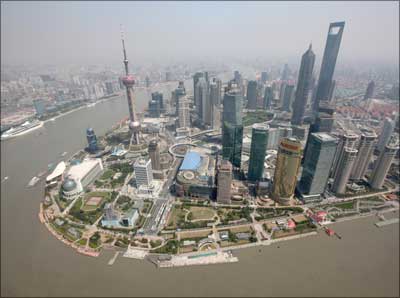 | « Back to article | Print this article |
China's GDP growth slows, but beats expectations
China's economy slowed down amid inflation concerns as its GDP growth rate slid to 9.5 per cent in the second quarter from 9.7 per cent in the first, while the economy in general expanded by 9.6 per cent in the first half of this year.
China's GDP growth rate slowed to 9.5 per cent in the second quarter of the year from 9.7 per cent in the first quarter, the National Bureau of Statistics said on Wednesday.
The gross domestic product rose by 9.5 per cent in the second quarter, tapering off slightly from the 9.7 per cent growth rate posted in the first quarter, NBS spokesman Sheng Laiyun told a press conference.
According to preliminary statistics, the country's GDP reached 20.446 trillion yuan ($3.146 trillion) in the first six months, Sheng said.
China's economic performance was 'generally good' and developed according to macro-economic regulation in the first half, he said.
China's consumer price index, the main gauge of inflation, rose 5.4 per cent year-on-year in the first half of this year, accelerating from 5 per cent in the first quarter of this year.
Click NEXT to read on . . .
China's GDP growth slows, but beats expectations
Food prices, which account for nearly one-third of the basket of goods in the nation's CPI calculation, rose 11.8 per cent in the first six months vis-a-vis the corresponding year-ago period, according to the NBS.
The figure was higher than the 11 per cent increase in the first quarter.
In June, the CPI rose 6.4 per cent year-on-year, the highest level since June, 2008.
Food prices, which account for nearly one-third of the basket of goods in the nation's CPI calculation, jumped 14.4 per cent in June, 2011, in comparison to the same month last year, a significant increase from 11.7 per cent in May.
Growth in non-food prices also accelerated to 3 per cent year-on-year in June, up 2.9 per cent from May.
Commenting on the rising food prices, Chinese Premier Wen Jiabao said the government needs to cool down consumer prices while avoiding major fluctuations in the country's economic growth.
Click NEXT to read on . . .
China's GDP growth slows, but beats expectations
"Stabilising prices remains the top priority for our macro-regulatory policies," Wen said in a statement two days ago as the government grappled with three-year record high inflation.
Wen said that a moderate monetary policy and stable supply of food are necessary to tame inflation.
He also said that measures to cool down the country's runaway property market should be properly implemented in order to help combat inflation.
While discussing the risks of local government debt, which crossed $1.66 trillion, Wen urged local authorities to control debt growth while properly dealing with existing debt.
The National Audit Office estimated that local governments borrowed a total of 10.7 trillion yuan ($1.66 trillion) as of the end of last year.
As per data released on Wednesday, China's retail sales of consumer goods rose 16.8 per cent year-on-year to 8.583 trillion yuan ($1.32 trillion) during the first half of this year.
Click NEXT to read on . . .
China's GDP growth slows, but beats expectations
In June, the country's retail sales grew 17.7 per cent from one year earlier and were up 1.38 per cent from May.
Urban retail sales increased 16.9 per cent year-on-year to 7.445 trillion yuan during the first half, while rural retail sales climbed 16.2 per cent to 1.138 trillion yuan, the NBS said.
The catering sector generated sales of 957.9 billion yuan, a rise of 16.2 per cent in comparison to a year ago, while commodities retail sales increased 16.9 per cent to 7.63 trillion yuan.
Automobile sales slowed during the first half as the government has suspended or cancelled preferential policies for vehicle purchases.
Auto sales grew by 15 per cent during the first half, down 22.1 percentage points year-on-year.
The government slashed its car purchase tax for small engine vehicles from 10 per cent to 5 per cent in 2009.
It raised the lowered tax to 7.5 per cent in 2010 and then put it back at the normal rate at the start of this year.
Sales of furniture as well as home appliances and AV equipment jumped 30 per cent and 21.5 per cent during the same period, down 8.5 percentage points and 7.3 percentage points from one year earlier, respectively, the NBS said.



